Difference between revisions of "Leather lamination - Laminating leather"
| Line 4: | Line 4: | ||
| − | ==Lamination on the [[Flesh side|leather back | + | ==Lamination on the [[Flesh side|leather back]]== |
| − | Laminating | + | Laminating leather means coating or gluing something to the back. This backing can be made with a different type of leather, but also with films, foams or linings. The lamination is done for protective reasons and to reinforce the leather with the properties of the laminated material. |
| − | When laminating [[car leather|car]] or [[leather furniture|furniture]] upholstery leather, the entire | + | When laminating [[car leather|car]] or [[leather furniture|furniture]] upholstery leather, the entire back of the leather is coated with a laminating material. A lamination material is about 3 to 4 millimetres thick. The adhesive is applied by means of pressure and temperature. |
| Line 51: | Line 51: | ||
| − | Advantages of this lamination: Real leather can stretch over time. The leather becomes [[Dents - Over stretching - Sagging in leather|wavy and bumpy]]. The lamination prevents this happening. In addition, the lamination facilitates | + | Advantages of this lamination: Real leather can stretch over time. The leather becomes [[Dents - Over stretching - Sagging in leather|wavy and bumpy]]. The lamination prevents this happening. In addition, the lamination facilitates the formations of special shapes and replaces the otherwise conventional cushioning wool. |
| Line 75: | Line 75: | ||
==[[Colour migration#Colour migration by on the back of leather laminated material|Colour migration]]== | ==[[Colour migration#Colour migration by on the back of leather laminated material|Colour migration]]== | ||
| − | When laminating, care must be taken to ensure | + | When laminating, care must be taken to ensure there is no possibility of dye transfer. Dyed textile fabrics can lead to [[Colour migration#Colour migration by on the back of leather laminated material|colour migration]] from the fabric. Over time these dyes penetrate through the leather and can show up on the upper surface. |
Revision as of 15:21, 23 March 2017
Contents
Lamination on the leather back
Laminating leather means coating or gluing something to the back. This backing can be made with a different type of leather, but also with films, foams or linings. The lamination is done for protective reasons and to reinforce the leather with the properties of the laminated material.
When laminating car or furniture upholstery leather, the entire back of the leather is coated with a laminating material. A lamination material is about 3 to 4 millimetres thick. The adhesive is applied by means of pressure and temperature.
The fabric lamination is well glued.
The leather perforation goes through the glued lamination.
The leather perforation in this case doesn't go through the glued lamination.
The lamination can be made of a wide range of materials.
Fabric lamination behind the perforation.
Advantages of this lamination: Real leather can stretch over time. The leather becomes wavy and bumpy. The lamination prevents this happening. In addition, the lamination facilitates the formations of special shapes and replaces the otherwise conventional cushioning wool.
The lamination makes it possible to achieve special shapes more easily.
Stretch leather
In the case of stretch leather, a flexible fabric is laminated to the back of the leather.
Leather trousers made of laminated stretch leather.
Colour migration
When laminating, care must be taken to ensure there is no possibility of dye transfer. Dyed textile fabrics can lead to colour migration from the fabric. Over time these dyes penetrate through the leather and can show up on the upper surface.
Colour migration in the area of back lamination with a dark fabric.
Colour migration or adhesive migration in the area of back lamination with a white fabric.
Additional information







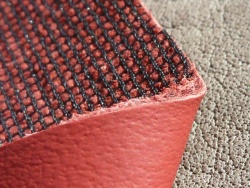
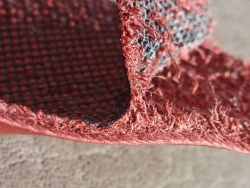
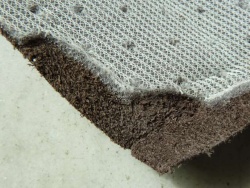
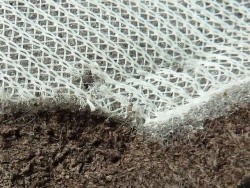
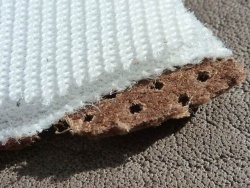
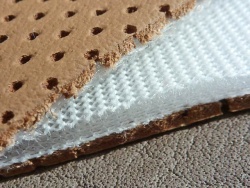
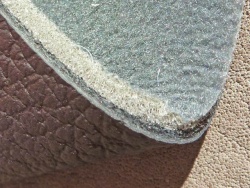
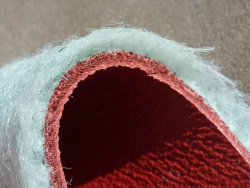
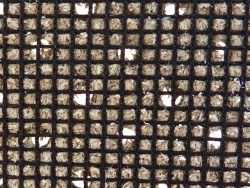
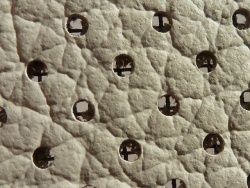
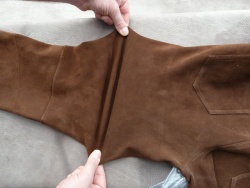
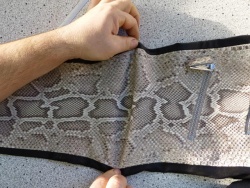
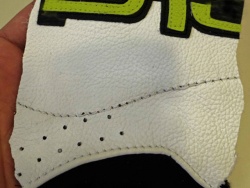
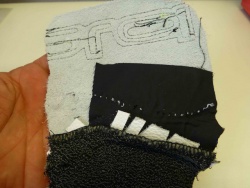
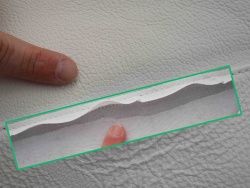
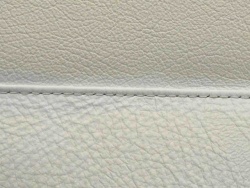

 a kotori web solution
a kotori web solution